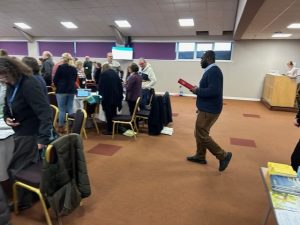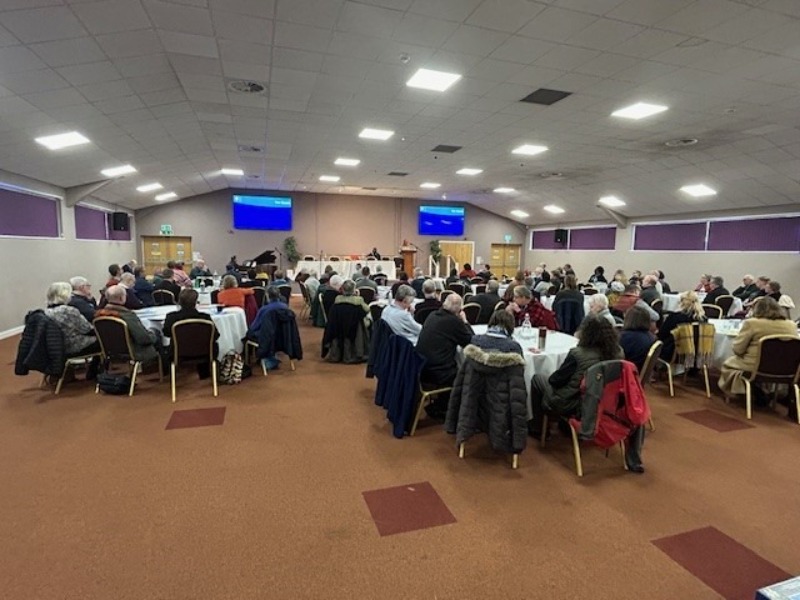The 2024 meeting of the United Reformed Church (URC) Assembly Executive opened on 9 February at The Hayes Conference Centre in Swanwick, with a welcome by the Revd Dr Tessa Henry Robinson, Moderator of the URC General Assembly 2023-2024.
The Moderator also welcomed members into new roles and new members of Assembly Executive attending for the first time.
Session one
Karen Campbell and the Revd Stephen Anso-Adda, the Moderator’s chaplains, led lively worship, including hymns, prayer and poetry. Stephen sang “The Impossible Dream”.
He read the story of Samuel’s call by God from 1 Samuel 3, and Daniel Raddings read from 1 Corinthians 1 and 3 about the foolishness of God.

Karen preached, noting that Samuel was not an obvious person to bring God’s word, as he did not even know the Lord. At Assembly Executive, she said, there are some voices we turn off and others we find it easy to attend to.
Who do we give attention to? she asked. Who do we filter out? Who do we hear and who do we ignore? How do we know which voices are God’s? Karen quoted Tessa as saying: “Listening is pastoral and can be life-saving.” Are we ready to hear God’s voice? Karen asked. “Speak, Lord, your servant is listening. But are we?”
The session concluded with a short opportunity for members of Assembly Executive to introduce themselves to each other.
Session two
Update from Finance on budget progress
Alan Yates, URC Treasurer, gave a verbal update about the work done following the Assembly Executive Budget meeting which took place by Zoom on 28 November 2023.
In recent years, Alan reminded the Assembly Executive, meeting at the Hayes Conference Centre, Swanwick, that the Ministry and Mission (MoM) fund deficit has been increasing. At the meeting in November, Assembly Executive agreed that this was unsustainable, and it asked the Finance Committee to eliminate the deficit over the next five-seven years.
The consultations that have taken place since, Alan continued, have been done with grace. And he shared that in 2023, the Synods had given £1.9m to ‘top up’ the MoM fund. “Without that support, the fund would have been in deficit of £3m last year, and I thank the Synods for their generosity.”
Since November, the work has started to inform policies and tasks going forward, and included meetings with Synod Moderators, the Resource Sharing Task Group (RSTG) Convenor and Secretary, the General Secretariat, Synod Treasurers and representatives from Synod Trusts.
There is now a proposition, Alan continued, which might not be easy but has been described as sensible. “The URC can balance the MoM budget in seven years if receipts are kept at 2023 actuals, and, at the same time, reductions in expenditure by Assembly Committees and Church House of between 5% and 3% each year is achieved.”
The lion’s share might come from the sale of redundant buildings, but this is unpredictable.
To aid the process, the RSTG has agreed to help Synods unable to meet their target in any particular year.
Meetings with URC Committee convenors and secretaries will now take place.
Alan finished: “This is just a plan – the plan will need to respond to significant changes, and can be amended, remembering that at the November meeting, 20% of the vote was for a growth plan.”
H1 Ministries: URC Comptency Process
The Revd Mary Thomas presented Paper H1, which takes a pastoral approach in handling concerns around a minister’s performance so as to assist them to improve performance of their duties.
Mary advised Assembly Executive that this new process arose from responses from those who have had to implement the previous URC Capability Process, agreed at General Assembly 2020. They felt that process was similar to a disciplinary process and was not helpful.
Mary explained how the process of discernment (an inner sense of Call alongside external discernment) is a process that continues throughout Ministers’ work in various posts through the use of the Marks of the Ministry for Ministers of Word and Sacraments and Core Competencies for Church Related Community Workers.
Ministers are not expected to demonstrate gifts in all areas, so they are supported throughout their years of ministry to grow in recognition and self-awareness of what learning could enhance their practice and what tools could equip them.
Sometimes, Mary explained, the performance of a minister may fall short, and if this does not fall under a disability as defined under the Equality Act 2010, the revised Competency Process can be used to assist the minister and the relevant council of the church.
“It is hoped that this process, which mirrors that of the Amber Light process used by our RCLs, might achieve an improved working life for the minister and help them to flourish in their post,” Mary said.
“It also allows for the fact that this may not be possible and outlines how the relevant council of the church may seek to move the minister to inactive status.”
The resolution was then put to Assembly Executive and was carried unanimously.
Reporting team: Stephen Tomkins, Ann-Marie Nye, Laurence Waring and Andy Jackson.

